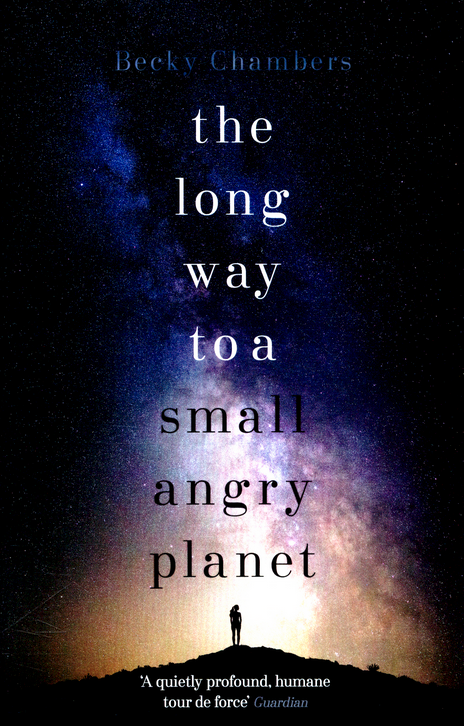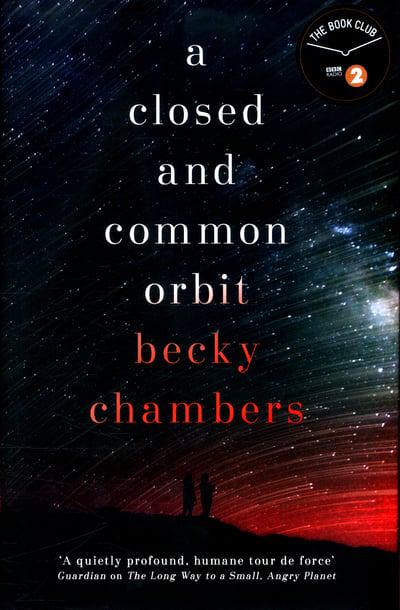
The Long Way To A Small Angry Planet
Of everything I’ve read in the past few months, these two books are my favourites. That is not simply because they are rooted in fellowship, rather than in conflict, or that they are the only two books whose characters felt like my friends by the time I had finished them, although they are. It is rather that they are complete within themselves, both as individual books and as a pair, and they are not like anything I have read before.
That is not to say that they are some sort of exotic SF that has somehow found a way to reinvent the entire genre. No major element within the tapestry of which they are made is entirely original to anyone who has read, watched or played science-fiction themed art over the last two decades. There are spaceships, a war or two, oppressive social conditions and alien species: lots of alien species.
Rather, their distinctiveness lies in the fact that these are determinedly civilian stories. They focus upon how people make sense of their lives, their friendships and their identities, rather than upon how they assert themselves through power or quest or battle. In fact, the only war action in either book is observed from the point of view of civilian contractors and only as they flee from the barbarity. The characters are victims and bystanders, without responsibility or agency, and the war is an interruption to what matters to them: how to live and be true to yourself while respecting and valuing the differences between yourself and others.
The Long Way To A Small Angry Planet is set aboard an engineering ship, Wayfarer, captained by a human, Ashby, who, besides his pacifism, is the closest character to a classic SF hero in either of the books. The lead character, Rosemary, is fleeing something, and in any of a hundred books I have read, it would have been lost love or a terrible mistake, but in this one, it is a more compelling detail, which I can’t reveal without spoiling the plot. Largely, the story is about Rosemary’s process of winning the acceptance and love of her shipmates, but that makes it sound trite. What elevates Rosemary’s adventure is the mirror provided by the different species who make up the crew.
Chief among them is Sissix, an Aandrisk. Aandrisks are a reptilian species whose family relations are based upon adoption and preference. Because they are an egg-bearing species, they have no natural affinity for their biological parents and their loyalties are, therefore, dictated by choice. Their social glue is sex, which is handled in the book with a poetry and joy that rises above what any male author would have made of it. Besides Sissix, we meet half a dozen other species of ‘sentient’, until human characters become what they are in the politics of the book’s ‘Galactic Commons’ universe: a minority group who are tolerated as just one exasperating element within a wondrous, metropolitan galaxy.
Successful alien characters are not rare in science fiction, but I think I have seldom read a book in which the interactions between so many species are handled with such panache or such convincing enjoyment. The book gave me the feeling I had when I first began attending gigs and festivals; of a world that is brighter than the one I inhabit, with more interesting people, who seem to be okay with having me around. Becky Chambers has managed to create a universe epitomising that rarest of literary phenomena: convincing optimistic science fiction. And then, as you finish the first book, full of love for the new universe you have encountered, and rush enthusiastically into the second one, she goes dark, and it gets even better.

A Closed and Common Orbit
It is not, strictly speaking, a sequel. Instead, it is like a spin-off which, for the first couple of chapters, left me feeling disappointed, as I grieved for the fellowship, good-will and sexiness of the Wayfarer crew. Avoiding plot spoilers for the first book is difficult here, but suffice to say that one character is uprooted from the crew in the care of a minor character from The Long Way To A Small Angry Planet, and has to adjust to living a very different existence. In flashback, the character who mentors her is revealed to have suffered a terrible childhood. This upbringing has left an emotional debt that has yet to be paid.
I can’t be much more specific without spoiling your enjoyment, and I really, really wouldn’t want to do that. A female hero who is driven by childhood terror has become a ghastly sexist trope in anime, game design and bad male SF (particularly of the ‘kick-ass babe’ variety), but this book is completely removed from those awful exploitations. Becky Chambers writes about pain because that is a part of the human (‘sentient’) experience, but she manages never to lose sight of the redemptive power of love, however deep she goes into the horror of being unloved. There is nothing trite or contrived-feeling about her stories and neither are they overworked. She writes with a sure touch, using detail only to advance her stories or to enrich her characters and settings, but never getting bogged down in self-indulgence. She is a writer you can trust, and her greatest theme is friendship. I want to be her friend.
Leave a Reply
You must be logged in to post a comment.